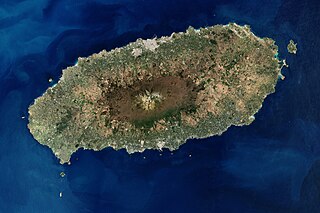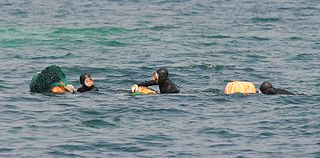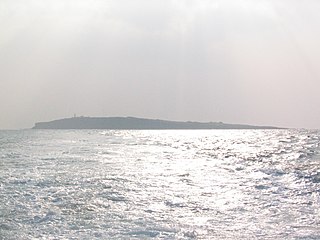Related Research Articles

Jeju Province, officially Jeju Special Self-Governing Province, is one of the nine provinces of South Korea. The province is situated on Jeju Island, formerly transliterated as Cheju or Cheju Do, the country's largest island. It was previously known as Quelpart to Europeans and during the Japanese occupation as Saishū. The island lies in the Korea Strait, southwest of South Jeolla Province, of which it was a part of before it became a separate province in 1946. Its capital is Jeju City and it is home to South Korea's tallest mountain, Mt. Halla.

Korean shamanism or Korean folk religion, also known as Shinism or Sinism or Shindo, is the polytheistic and animistic ethnic religion of Korea which dates back to prehistory and consists in the worship of gods and ancestors as well as nature spirits. When referring specifically to the shamanic practice, the term Muism is used.

The Jeju uprising was an uprising that occurred on Jeju Island in South Korea from April 1948 to May 1949. Residents of Jeju opposed to the Division of Korea had protested and had been on a general strike since 1947 against elections scheduled by the United Nations Temporary Commission on Korea (UNTCOK) to be held only in the territory controlled by the United States Army Military Government in Korea. The Workers' Party of South Korea and its supporters launched an insurgency in April 1948, attacking the police, and Northwest Youth League members stationed on Jeju mobilized to violently suppress the protests. The First Republic of Korea under President Syngman Rhee escalated the suppression of the uprising from August 1948, declaring martial law in November and beginning an "eradication campaign" against rebel forces in the rural areas of Jeju in March 1949, defeating them within two months. Many rebel veterans and suspected sympathizers were later killed upon the outbreak of the Korean War in June 1950, and the existence of the Jeju uprising was officially censored and repressed in South Korea for several decades.

Jeju Island is the largest island in South Korea, located in the Jeju Province. The island lies in the Korea Strait, below the Korean Peninsula, south of the South Jeolla Province. Jeju is the only self-governing province in South Korea, meaning that the province is run by local inhabitants instead of politicians from the mainland.

Haenyeo are female divers in the Korean province of Jeju whose livelihood consists of harvesting a variety of mollusks, seaweed, and other sea life from the ocean. Known for their independent spirit, iron will and determination, the haenyeo are representative of the semi-matriarchal family structure of Jeju.

Marado or Mara Island is an island 8 km (5.0 mi) off the south coast of Jeju, in southernmost South Korea, having an area of 0.3 km2 (0.12 sq mi). It is home to about 90 people, and has long been known for its population being composed of strong women and docile men. It's becoming a popular tourist destination, thanks to the many unusual rock formations, and is connected to the mainland by two regular ferries and numerous excursion boats.

Gotjawal Forest is a naturally formed forest located on the middle slopes of Halla Mountain, Jeju Island in South Korea. It covers the rocky area of ʻaʻā on Jeju Island off the southwestern coast of South Korea. Due to the geographical feature, the region remains largely undisturbed by people. The Gotjawal Forest is an enclave of the Southern Korea evergreen forests ecoregion, and is a favorite place of the Jeju locals.

Swallow the Sun is a 2009 South Korean television series starring Ji Sung, Sung Yu-ri, Lee Wan and Jun Kwang-ryul. It aired on SBS from July 9 to October 1, 2009 on Wednesdays and Thursdays at 21:55 for 25 episodes.

The Great Merchant is a 2010 South Korean historical drama starring Lee Mi-yeon, Han Jae-suk, Park Sol-mi, Ha Seok-jin, and Go Doo-shim. It aired on KBS1 from March 6 to June 13, 2010 on Saturdays and Sundays at 20:40 for 30 episodes.

Jeju Olle Trail is a long-distance footpath on Jeju Island, an island off the south-west coast of South Korea. The route mainly follows the coastline and consists of 21 connected numbered main routes, 5 sub-routes, and a short spur that connects to Jeju International Airport. On average, the routes are 16km in length and in total amount to 422km. The exact length and locations change over time as trails are modified or re-routed.
There was much controversy during the construction of Jeju Naval Base, which is a joint civil and Republic of Korea Navy base constructed by the South Korean government in Gangjeong village on the southern coast of Jeju Island, South Korea. By 2011, construction had been halted seven times by protesters concerned about the base's environmental impact and who saw it as a US-driven project aimed at China, rather than enhancing South Korean defense. In July 2012, the South Korean Supreme Court upheld the base's construction. It is expected to host up to 20 military vessels and occasional civilian cruise ships.

Jiseul (Korean: 지슬) is a 2012 South Korean war drama film written and directed by Jeju Island native O Muel. The film is shot in black and white with the entire cast composed of local actors speaking their natural dialect. "Jiseul" means "potato" in Jeju dialect. O said he picked it as the title of his film because "potatoes are considered a staple food in many countries, often symbolizing survival and hope." Set during the Jeju Uprising on the island in 1948, O said the film does not focus on the large-scale struggle, but on a forgotten true story about a group of villagers who hid in a cave for 60 days to escape from a military attack. They hid underground for months, cold and numb, far too close for comfort—just like the potatoes to which the title refers.
Nitratireductor basaltis is a Gram-negative, oxidase- and catalase-positive bacteria from the genus of Nitratireductor which was isolated from black sand from the Soesoggak beach on the Jeju Island in South Korea.

Warm and Cozy is a 2015 South Korean television series starring Kang So-ra and Yoo Yeon-seok. Written by the Hong sisters as a twist on the fable of The Ant and the Grasshopper, it aired on MBC from May 13 to July 2, 2015 on Wednesdays and Thursdays at 22:00 for 16 episodes.
O Muel is a South Korean film director and screenwriter. He wrote and directed the award-winning film Jiseul in 2012.
Croceitalea litorea is a Gram-negative, rod-shaped and non-motile bacterium from the genus of Croceitalea which has been isolated from seashore sand from the Jeju Island in Korea.
Aquimarina versatilis is a Gram-negative, aerobic and rod-shaped bacterium from the genus of Aquimarina which has been isolated from seashore sand from Jeju island in Korea.
Citrimicrobium is a Gram-negative, pleomorphic and motile bacteria genus from the family of Sphingomonadaceae with one known species. Citrimicrobium luteum has been isolated from the gut of the sea cucumber Stichopus japonicus from the Jeju Island in Korea.

The Jeju people or Jejuans are a subgroup of the Koreans who live in Jeju Island, South Korea.

The Naewat-dang shamanic paintings are ten portraits of village patron gods formerly hung at the Naewat-dang shrine, one of the four state-recognized shamanic temples of Jeju Island, now in South Korea. As Naewat-dang is now defunct, the works are currently preserved at Jeju National University as a government-designated Important Folklore Cultural Property. They may be the oldest Korean shamanic paintings currently known.
References
- 1 2 "Species: Joostella atrarenae". LPSN.DSMZ.de.
- 1 2 Kim, Byung-Chun; Lee, Kang Hyun; Kim, Mi Na; Jung, Min Young; Chang, Young-Hyo; Lee, Jongtae; Shin, Kee-Sun (February 2011). "Joostella atrarenae sp. nov., a novel member of the Flavobacteriaceae originating from the black sea sand of Jeju Island". Current Microbiology. 62 (2): 606–611. doi:10.1007/s00284-010-9750-y. PMID 20820783. S2CID 30597584.
- ↑ "www.uniprot.org".Cite journal requires
|journal=(help)
| This Flavobacteria-related article is a stub. You can help Wikipedia by expanding it. |